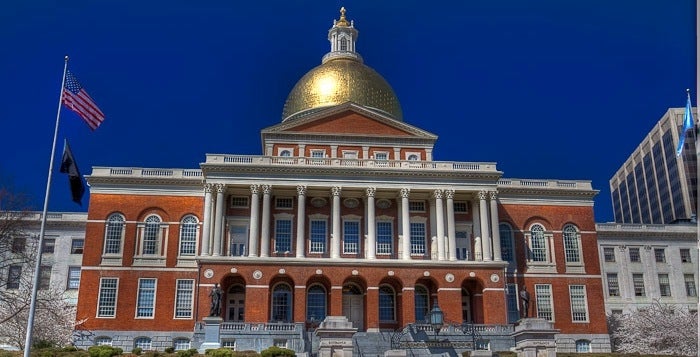Two Massachusetts senators are gearing up to fight trolls, but not the kinds of trolls that live under fairy-tale bridges or in online comment sections.
Instead, Sens. Eric Lesser and Richard Ross plan to take on patent trolls — people or companies that claim patent infringement and demand payment of a licensing fee from others who they claim are infringing upon an unspecified patent to avoid a lawsuit — in hopes of passing anti-patent trolling legislation into law next session.
“Patent trolls use patents as legal weapons instead of actually creating any new products or coming up with new ideas. Instead, trolls are in the business of litigation or threatening litigation,” Lesser, a Longmeadow Democrat, said on the Senate floor July 21. “They buy up patents cheaply from startup companies or entrepreneurs and then they use those purchases as weapons to extract further value.”
Boosted by the state’s technology and life sciences sectors, and the numerous universities and teaching hospitals, Massachusetts residents or organizations were awarded 7,234 patents in 2015 — behind only California, Texas and New York. And Massachusetts residents have been awarded 127,045 patents since 1977, the seventh most of any state, according to the U.S. Patent and Trademark Office.
Since Vermont became the first state to adopt anti-patent trolling legislation in 2013, 26 other states have put similar laws on the books, according to the National Conference of State Legislatures.
Patent trolling is also an economic issue. A 2013 White House report on the subject found that the victims of patent trolls paid $29 billion in 2011 to avoid lawsuits — a 400 percent increase from 2005. Between 2011 and 2013, the White House report said, patent trolling lawsuits accounted for 62 percent of all patent-related lawsuits in the country.
“Patent trolling was something I was very unfamiliar with, but certainly after I visited a couple companies down in my area that are the kind of innovators in our economy that we want to have here in the commonwealth, I understood why this is an issue,” Ross, a Wrentham Republican, said. “Not to stifle that in the future, I think it’s important (Lesser) and I continue to work through the fall to come up with something that really works to protect these entrepreneurs from patent trolls.”
Lesser and Ross introduced an anti-patent trolling amendment to the economic development bill earlier this month but withdrew it, saying they preferred to work through the fall to craft a bill that would get a full vetting through the committee process next session.
The amendment would have required a patent holder asserting infringement to reveal in a claim on infringement who they are, the number of the patent they believe is being infringed upon, specific details on how the patent is being infringed upon, and they must allow sufficient time for the recipient of an infringement letter to review and respond to the claims.
The amendment would have exempted university research centers, teaching hospitals and other “organizations that legitimately assert their patent rights,” Lesser said.
“What we’re looking to do here is to separate out the bad actors, the people who are intentionally taking advantage of young entrepreneurs who don’t necessarily know the difference between a legitimate patent claim and one that is not legitimate,” he said.
Earlier this year, a collection of Massachusetts companies and organizations wrote a letter to the Senate urging action on a bill (S 178) similar to the Lesser/Ross amendment. The group — which included the Greater Boston Chamber of Commerce, the Mass. Technology Leadership Council, TripAdvisor, Carbonite, Level Up, Google Ventures, iRobot, Twitter, HubSpot and the Cambridge Innovation Center — wrote that patent trolling is “ambulance chasing applied to patents.”
“For emerging companies it can mean the difference between success and failure. For larger companies, the hundreds of thousands of dollars used to litigate these cases means the difference between hiring for a new position, or not,” the group, calling itself Protect Innovation in MA, wrote. “In all cases it distracts the most valuable employees from driving innovation at their organizations.”
The Consumer Protection and Professional Licensure Committee gave the patent trolling bill a favorable recommendation in March and the legislation has been in Senate Ways and Means since then.
Lesser said Massachusetts could lose some of its clout with entrepreneurs and tech companies if it doesn’t take action to protect fledgling companies from the threat of harassing litigation.
“Despite the fact we’re one of the national and really global leaders in innovation and startups, we are not a leader on protecting innovation in our state when it comes to fighting patent trolls,” he said. “Frankly, without a law like this Massachusetts runs the risk of falling even farther behind and losing some of our most talented entrepreneurs who will go elsewhere where other states do afford these protections.”
Lesser and Ross both acknowledged in withdrawing their amendment that they plan to bring legislation back to the Senate early next session.
“I look forward to having this debate come January and certainly to finding out what my colleague and I can do together to make this a really super bill that helps those entrepreneurs in the Commonwealth shine,” Ross said.

